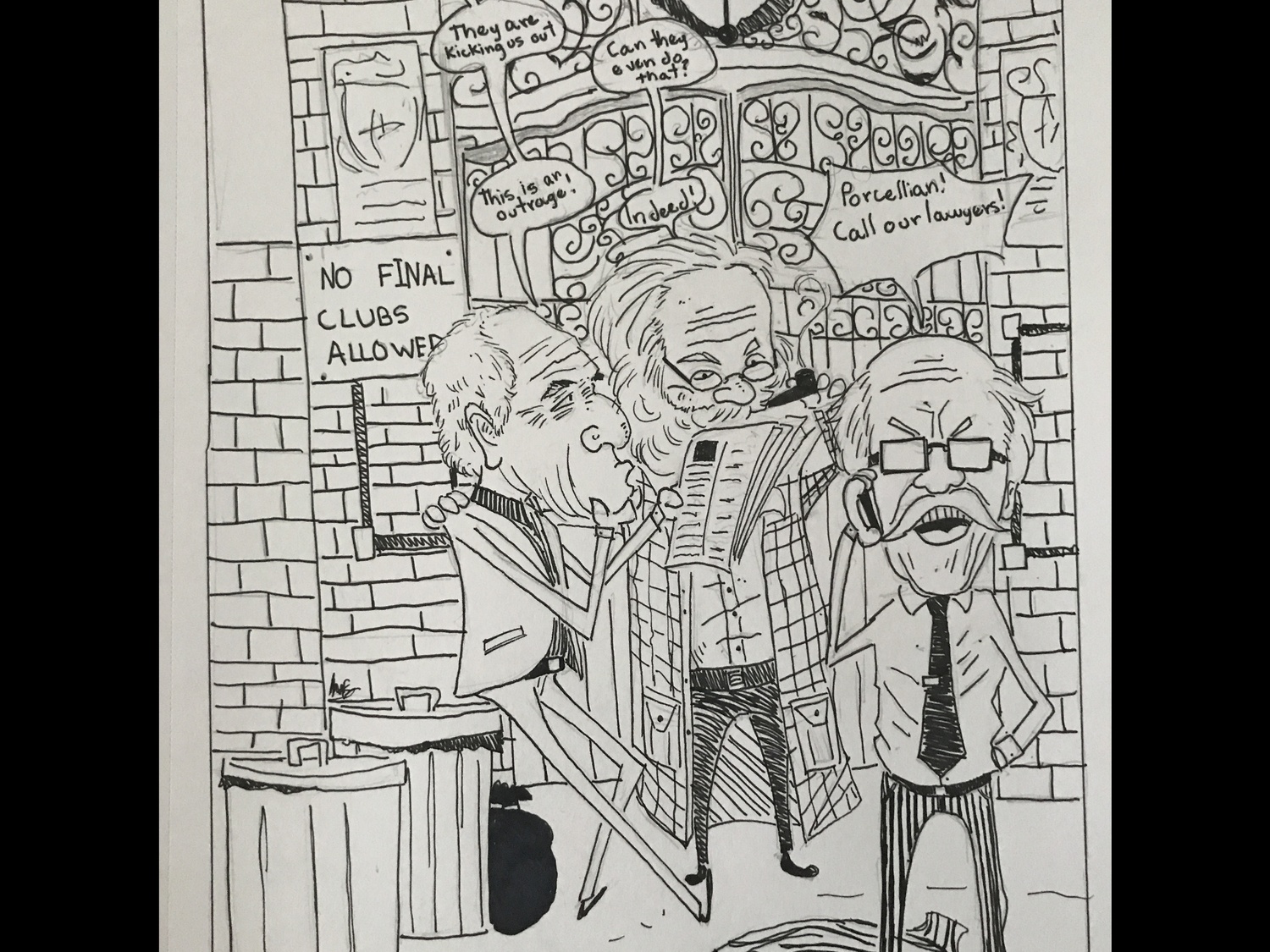
News
Cambridge Residents Slam Council Proposal to Delay Bike Lane Construction

News
‘Gender-Affirming Slay Fest’: Harvard College QSA Hosts Annual Queer Prom

News
‘Not Being Nerds’: Harvard Students Dance to Tinashe at Yardfest

News
Wrongful Death Trial Against CAMHS Employee Over 2015 Student Suicide To Begin Tuesday

News
Cornel West, Harvard Affiliates Call for University to Divest from ‘Israeli Apartheid’ at Rally
Harvard on a Friday Night
The interweaving of Harvard social life with exclusivity and elitism, in the wake of recent sanctions recommendations.
The night has cracked open and yolk is smeared across the sky as many young Lamonsters close their textbooks and feel for the braille on their foreheads, reminding them to get to class. Thursday has unfurled into Friday under the limelight of library desk lamps, yet again. These student know the drill by now: The walk of shame from the library to the classroom is easy, as though their soles have been trained to follow this path. They walk on eggshells as the day unfolds into the afternoon and the afternoon leaks into the night. Another weekend arrives like Atlas shrugging to lift the stress of the week before it. The two day vacation promises to be a reprieve from the craze that might be associated with the typical flotsam and jetsam of an academic week at Harvard.
However, a reprieve may come with a pen and a checklist. And if you’re name’s not on the list—well, you might not get the reprieve you were looking for—and that might not be a bad thing. But you’re still looking for this break, sans list. Remember Atlas shrugging? You are Atlas, and you want to shrug. Where do you go to shrug off the week?
Unfortunately, socialization at Harvard is at many times hindered by the presence of requirements and an exclusionary thinning-out process. Different groups have different ways to narrow their circles. For example, the Hasty Pudding Club has been known in the past to have odd challenges to complete in order to become members, including having to run “hastily” around the yard and perform other antics. Sororities and fraternities, another nexus of socialization on campus on the weekends, are saddled with a detailed rushing process and a notable price tag that reduces the number of participants.
Nevertheless, these methods of scaling a social ladder in order to participate in a social group pale in comparison to the hoops students catapult through in order to navigate the final clubs. The clubs take center place in, at least, students’ imagination of socialization on campus—an unarguable fact, especially given the yearlong discussions that rippled from the first proposal of sanctions.
I know it’s summertime and I’m a world away from Harvard Friday nights and the brick buildings lining Mt. Auburn Street, but somehow the conversation regarding social exclusivity and elitism still lingers. It still dominates a part of my life, as well as the lives of other Harvard students, with an odd sense of presence. And this presence, and the response to it, must be addressed.
The ways in which people believe the matter should be addressed, however, differ widely. A writer for the Huffington Post calls for student autonomy, vehemently arguing against the first round of sanctions. The National Review believes that the latest response from the committee infringes on students’ rights of free association. The Atlantic points its finger at the exclusivity and elitism involved in simply being admitted as the ultimate “source of all evil.” Students at the College have repeatedly written op-eds giving their perspective on the role of final clubs and exclusivity on campus. The response of the final clubs themselves? Possibly suing Harvard.
Yet, in spite of all these opinions, in spite of all those wrestling with the terms and conditions of the newest edition of the sanctions, the problem of exclusivity in Harvard’s social sphere on a Friday night will remain regardless of the presence of these organizations. This is not to say that nothing should be done to begin dismantling organizations that utilize discriminatory factors, often on socioeconomic lines, to promulgate class elitism and exclusivity.
On the contrary, the newest recommendations promise to address such concerns, although simultaneously glossing over the benefits that female social groups bring to their members. Students must be wary of accepting this one version of fighting exclusivity at the College panem et circenses. Other clandestine groups will inevitably form to fill the social void the final clubs will leave, and the same problem will continue to plague the institution.
So, now you’re a Harvard student post-new sanctions and it’s a Friday night. Outside the brick buildings that line Mt. Auburn St., you can almost hear the tense phone calls from final club board members to their attorneys, assessing the legal minefield that lies ahead. The pens and checklists are less noticeable, but the houses are still there, and people are still inside, the door still closed. But you keep walking by anyway, walking on those same eggshells, pretending you don’t hear the cracks.
Jessenia N. Class ’20 is a Crimson editorial editor in Quincy House. Her column appears on alternate Tuesdays.
Want to keep up with breaking news? Subscribe to our email newsletter.

